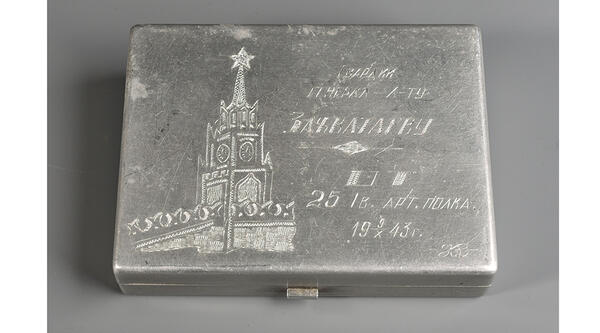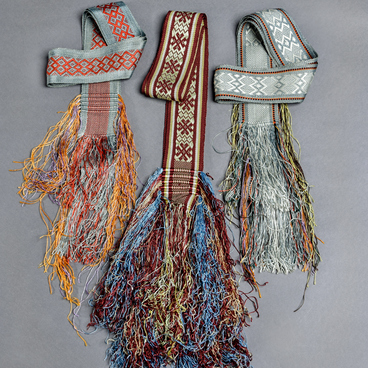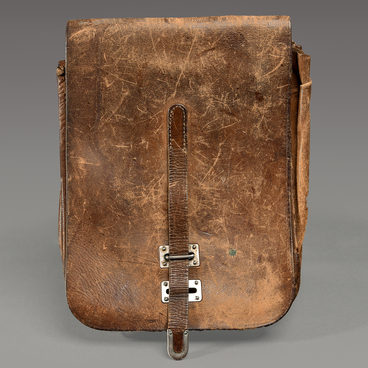The cigarette case presented at the exhibition was presented by Red Army soldiers of the Guards Artillery Regiment to their commander — Lieutenant General Nikolai Zakhvataev.
The simplest images on Soviet cigarette cases were performed in the engraving technique. In the 1930s, they began to depict Red Army soldiers and workers, less often a collective farmer who stood in the rays of the rising sun against the background of the factory.
Compositions of sickle and hammer, wheat ears, banners, and factories were popular. There were often pictures of planes.
Some cigarette cases were created as a reward for the Red Army soldiers or shock workers, in this case a corresponding inscription was engraved on the back cover.
During the Great Patriotic War, cigarette cases were also used as a special award at the front. For example, officers were honored a cigarette case with Stalin’s portrait on it and a dedicatory inscription on the cover.
After World War II, in the USSR a cardboard cigarette pack became available for use instead of metal cigarette cases. They superseded gradually cigarette cases in mass production.
Nikolai Zakhvataev, the owner of the exhibited cigarette case served in the Red Army since 1918. He occupied various command assignments, including Tactics Department instructor of the Military Academy of the General Staff.
In June 1914, Zakhvatayev went off to war. For his skillful troop command and control during Hungary’s liberation and carrying by assault the capital Vienna, as well as courage and heroism he was awarded the title Hero of the Soviet Union., by the Presidium of the Supreme Soviet of the USSR decree on April 26, 1945.
During the war, Zakhvatayev was mentioned 13 times in the Supreme Commander-in-Chief creditable orders. On June 24, 1945, he participated in the Victory Day parade on Red Square in Moscow in the rank of Colonel-General.
During the 1945 Soviet-Japanese War, Zakhvatayev led the 35th Army. After the end of hostilities, he kept his military career going. From 1957 to 1960, Zakhvatayev was the Hungarian People’s Army military adviser. He retired in 1960. On February 15, 1963, Zakhvatayev passed away.
The simplest images on Soviet cigarette cases were performed in the engraving technique. In the 1930s, they began to depict Red Army soldiers and workers, less often a collective farmer who stood in the rays of the rising sun against the background of the factory.
Compositions of sickle and hammer, wheat ears, banners, and factories were popular. There were often pictures of planes.
Some cigarette cases were created as a reward for the Red Army soldiers or shock workers, in this case a corresponding inscription was engraved on the back cover.
During the Great Patriotic War, cigarette cases were also used as a special award at the front. For example, officers were honored a cigarette case with Stalin’s portrait on it and a dedicatory inscription on the cover.
After World War II, in the USSR a cardboard cigarette pack became available for use instead of metal cigarette cases. They superseded gradually cigarette cases in mass production.
Nikolai Zakhvataev, the owner of the exhibited cigarette case served in the Red Army since 1918. He occupied various command assignments, including Tactics Department instructor of the Military Academy of the General Staff.
In June 1914, Zakhvatayev went off to war. For his skillful troop command and control during Hungary’s liberation and carrying by assault the capital Vienna, as well as courage and heroism he was awarded the title Hero of the Soviet Union., by the Presidium of the Supreme Soviet of the USSR decree on April 26, 1945.
During the war, Zakhvatayev was mentioned 13 times in the Supreme Commander-in-Chief creditable orders. On June 24, 1945, he participated in the Victory Day parade on Red Square in Moscow in the rank of Colonel-General.
During the 1945 Soviet-Japanese War, Zakhvatayev led the 35th Army. After the end of hostilities, he kept his military career going. From 1957 to 1960, Zakhvatayev was the Hungarian People’s Army military adviser. He retired in 1960. On February 15, 1963, Zakhvatayev passed away.



